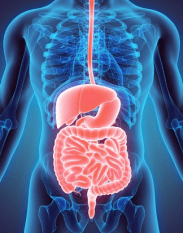What’s good for your gut is good for your health
July 30, 2018
By: St. Joseph Mercy Health System
Categories: Digestive Health
Your body contains a complex digestive system made up of the gastrointestinal tract (esophagus, stomach, small intestine and large intestine) as well as the liver, gallbladder, biliary tract and pancreas.
According to Naveen Reddy, MD, a St. Joseph Mercy Oakland gastroenterologist, “While these organs work in conjunction to metabolize, digest and absorb nutrients from our diet, they also have numerous other functions to maintain health. For example, the pancreas produces insulin to help control a person’s blood sugar. The liver is responsible for metabolizing toxins and numerous types of medications a patient may be taking. And the large intestine contains billions of healthy bacteria which help with digestion and help maintain normal, regular bowel movements.”
Any one of these organs failing to function properly can cause health concerns. According to Dr. Reddy, “Symptoms can range from a minor discomfort from acid reflux or mild constipation, to severe, life-threatening issues such as unintentional weight loss, vomiting blood or jaundice (which is a sign of severe liver disease). Some digestive symptoms can become life-threatening if not addressed early.”
If you notice a change in your bowel habits, bleeding or any other digestive issues, Dr. Reddy advises you to discuss your changes with your primary care physician and ask if a referral to a gastroenterologist is necessary.
According to Bashar Okka, MD, a St. Joe’s internal medicine physician, “A healthy digestive system begins with a healthy diet and maintaining a healthy and a well-balanced caloric intake that includes five or more servings of fruits and vegetables a day.”
Dr. Okka says that most people who follow simple, healthy lifestyle choices can avoid disruptive digestion problems. If you do experience digestive issues due to a specific food, avoidance of  that food is a key, says Dr. Okka. He says that treatment for a simple upset stomach triggered by certain foods or alcohol can begin with an over-the-counter antacid. However, he warns that patients should not use an over-the-counter antacid for more than two weeks.
that food is a key, says Dr. Okka. He says that treatment for a simple upset stomach triggered by certain foods or alcohol can begin with an over-the-counter antacid. However, he warns that patients should not use an over-the-counter antacid for more than two weeks.
Any upset stomach or heartburn that lasts more than two weeks or does not respond to simple over-the-counter treatment should prompt a consultation with a physician. Dr. Okka also recommends that any upset stomach with other symptoms, such as nausea, vomiting, diarrhea or fever, should prompt a visit to your physician’s office as soon as possible.




